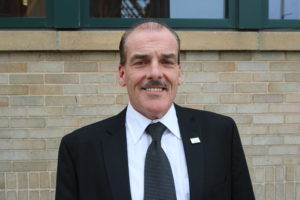Warren G., age 52, was born in Baltimore City,
Maryland. “My early childhood was loving and
confusing,” recalls Warren. “I was born out of
wedlock and hidden from my father’s family for
two years. The only person who knew about
me was my half-sister. When my father finally
brought me out to my family, my stepmother
considered me a “blessing” because she could
not produce a son for him. At an early age,
I learned that blood was NOT thicker than
water; love is thicker than blood. I was like
Moses, and my nickname was MOE. I was
raised away from my family and then returned
to their love.“
“My dad was a jazz musician. He was a
functional addict and became the first AfricanAmerican car salesman at a local dealership. He
could make money but could not hold onto it.
I would go for weeks at a time, not seeing my
dad. I would spend time with my great aunt
Eiddie, my dad’s mother’s sister, who was like
a grandmother to me, taught me the Lord’s
prayer, and took me to church. She was loving
and spiritual.”
“I did well in school, getting A’s and B’s while
playing sports. My dad packed us up to get
out of Baltimore, and we moved to Sykesville,
MD. I was popular and never wanted for
anything. My dad would have good women
in his life who I did not become attached to
because they never lasted. His relationships
in life caused me not to get attached to
others as a defense mechanism and go in
my own direction.”
“I started smoking marijuana at the age
of eight. I would smoke regularly during
6th through 8th grade. There were no
consequences. I became an outspoken
leader who could manipulate and receive
the attention I did not get at home. During
my sophomore year of high school, I wore
my dad’s jacket to school, and in one of the
pockets, I found a bag of cocaine. Despite my
burgeoning drug habit, I received a scholarship
to play football at Juniata College. I decided to
attend college even though my dad told me I
would not succeed. He was right. I failed out,
got my high school girlfriend pregnant, and
had a daughter.”
“At the age of 35, I got married to another
person experiencing addiction, and we had
two sons. Things got so bad that I knew we
needed to go to rehab. I sent her first,
knowing what would happen if she was
left alone while I got help. She lasted
fifteen days in rehab. We were in full-blown
addiction and living in a hotel on Fayette
Street, Baltimore. One day, I went to the
lobby to pick up our two boys, ages 7 and
9, and she overdosed and died by the time
we got back. I could not open the door
to the room, but when maintenance got
us in, I was losing my mind. A nice lady
notices my demeanor and offers to watch
my sons. How do you explain death to a
7-year-old? I simply said that we would see
Mom again.”
“I got clean from narcotics for eight
months, but in January 2022, I was driving
down Northern Parkway and decided
to snort some fentanyl. Immediately, I
realized that I had done too much. I pulled
over as soon as I could and woke up in an
ambulance. I was dead for eight minutes.
The paramedics hit me three times with
Narcan. My girlfriend told me that I
needed to go to rehab. I lost my car and
my place and had no job. God had finally
narrowed my path, so I called Helping Up
Mission (HUM) and spoke with George
Enriquez, HUM’s program coordinator
of intake, and he told me to show up on
Monday.”
“The rest is history. Today, I am working
on the 12-steps of Narcotics Anonymous
(NA) and on my 8th step. I am working
on changing my behavior. I have learned
that my life transformation will evolve
until the day that I die. I spent 44 years
in active addiction, and change has
happened gradually in the eleven months
since I walked through HUM’s doors. HUM
has changed my life. My work therapy
assignment is Treatment Coordinator –
Intern. I facilitate spiritual recovery classes
and NA and Alcoholics Anonymous
meetings, which help me focus on my
recovery. I try to do the little things and
the right things when nobody is looking. I
finally returned to school at the University
of Baltimore and changed my degree from
pre-law to drug counseling. Soon, I will
take the test to become a Certified Peer
Recovery Specialist. I am surrendering the
outcome of my new life to God’s plan.”
“To all the people that make HUM
possible, THANK YOU for doing the right
thing when nobody else is looking!”
